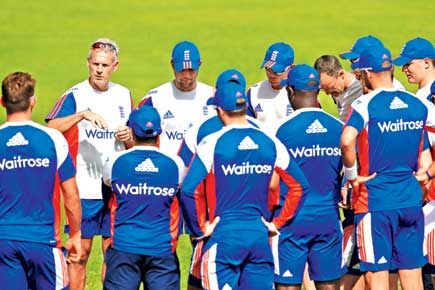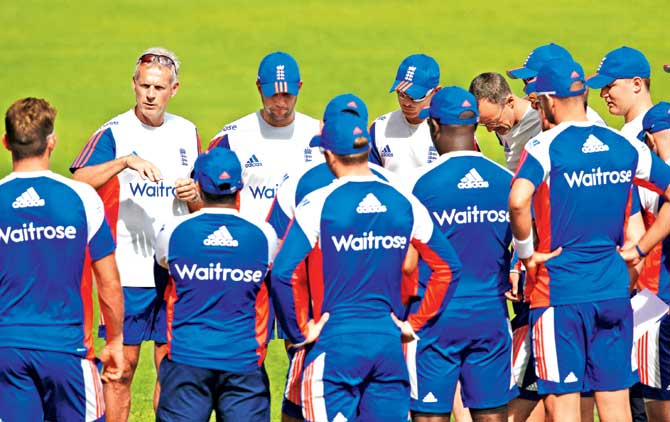Except for the significant disparity in their ICC rankings, England and the West Indies start the first Test series of the year at the Sir Viv Richards Stadium in Antigua today with much in common

Coach Peter Moores (left) addresses England players during a training session at Sir Vivian Richards Stadium in Antigua on Saturday
Except for the significant disparity in their ICC rankings, England and the West Indies start the first Test series of the year at the Sir Viv Richards Stadium in Antigua today with much in common.
Coach Peter Moores (left) addresses England players during a training session at Sir Vivian Richards Stadium in Antigua on Saturday. Pic/Getty Images
ADVERTISEMENT
England, below only South Africa and Australia on the Test table, regard the three, back-to-back matches as the chance to shake off the stigma of their habitually dismal performance in the preceding World Cup. They have been put on notice by the incoming chairman of their board that "there will be some enquiries" if they fail to beat what he describes as "mediocre" opponents.
The once mighty West Indies have propped up the ICC's lists, above only Bangladesh and Zimbabwe, for the better part of two decades. A repeat of their hard-fought, 1-0 triumph the last time the teams met in the Caribbean six years would be a timely boost in Phil Simmons' debut as head coach.
Intense public criticism
Both are administered by boards frequently under intense public criticism. The censure of the "nexus of self-preservation" of the England and Wales Cricket Board (ECB) in the 2015 edition of the prestigious Wisden Cricketers' Almanack has been repeated several times over in relation to the West Indies Cricket Board (WICB).
Its contention that in 2014 "English cricket repeatedly lost touch with the basic idea that the national team belongs to us all" could have been reproduced from any number of West Indian publications. For both teams, the shadows of absent high-profile players continue to hover menacingly.
Kevin Pietersen's refuses to go away for England; if West Indians such as Chris Gayle, Sunil Narine and Dwayne Bravo are performing in the distant, simultaneous Indian Premier League (IPL), live television keeps them in the consciousness of a passionate public disenchanted by repeated failure.
There are other distractions. The WICB is focused as much on persuading the Board of Control for Cricket in India (BCCI) to mitigate its claim for US$42 million compensation for the team's early abandonment of the Indian tour last October over a contract dispute with its players as it is on the challenge against England. A delegation is likely to head to Delhi to plead its case midway through the series.
Just alike
ECB's sacking of its managing director, Paul Downton, last Tuesday less than a week before the first ball is bowled in Antigua equates to the WICB's dismissal of head coach Ottis Gibson last August on the eve of the home series against Bangladesh.
Until Simmons' appointment, assistant coach Stuart Williams stood in Gibson's stead for seven months, through difficult assignments in South Africa and the World Cup; the ECB is unlikely to take as long to select Downton's replacement in a new role as "director of cricket" yet former captains Michael Vaughan and Alec Stewart have already shown guarded interest.
The effect of the long wait on the West Indies was that players were confused by repeated speculation over who their new coach would be; it is likely to be similar for the England team as head coach Peter Moores, recalled by Downton last year for a second stint in the job, is generally considered to be on thin ice.
Both teams revert to their settled Test captains, Denesh Ramdin in his fourth series since succeeding Darren Sammy last June, Alastair Cook back for his ninth after Pietersen's brief, contentious spell five years ago. Reportedly still offended by his omission from the triangular ODI series series in Australia and the subsequent World Cup, he would have taken some satisfaction from his hundred in the first of the two warm-up matches against a St Kitts Invitation XI but not much.
The exercise was all but meaningless. The local team mustered 59 all out and 76 for seven and conceded 379 for six of whom Cook and Ian Bell retired out. It was further embarrassment for West Indies cricket that has endured more than its fair share in its prolonged period of decline.
Experienced, well-travelled English journalists covering the tour were appalled. Paul Newman of the Daily Mail saw it as "an almost tragic example of the steep decline of Caribbean cricket". The upshot was that regulations for the second match were altered, transferring six England players to the local team to give it more of an edge.
It left England with little to go by in determining their first Test XI. The West Indies had named a squad of 20 who, at the same time, were in Antigua training, practicing and hearing Simmons' ideas for the first time. Darren Bravo, the established No 3 with six hundreds and an average of 43.6 in his 32 Tests, and fast bowler Kemar Roach, the leading wicket-taker with 113 wickets in his 29 Tests, were among the 20 and certain to be in the final XI.
There has been little time for them to get into shape. Bravo withdrew from the series in South Africa in December for "personal reasons" and has had no serious cricket since the Bangladesh series last September; Roach, eliminated after wrenching his ankle following 15.5 testing overs in the first Test in South Africa, was clearly short of work in 22 overs, and a solitary wicket, in three World Cup matches. They need to be at their best for the West Indies to make it a contest that negates the ICC rankings.
Tony Cozier continues to be the voice of West Indies cricket
 Subscribe today by clicking the link and stay updated with the latest news!" Click here!
Subscribe today by clicking the link and stay updated with the latest news!" Click here!






